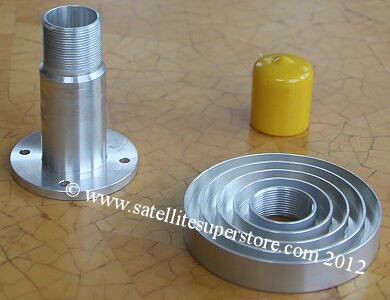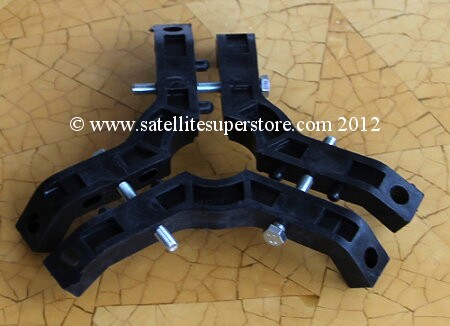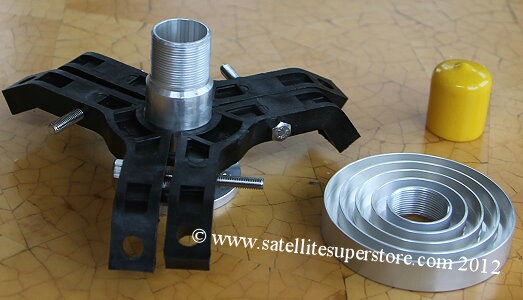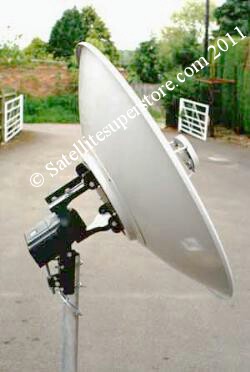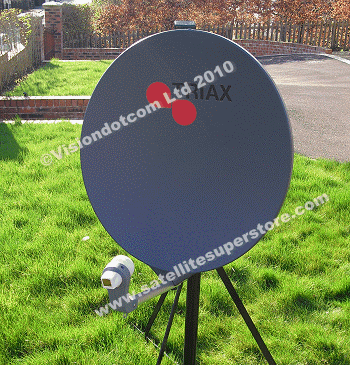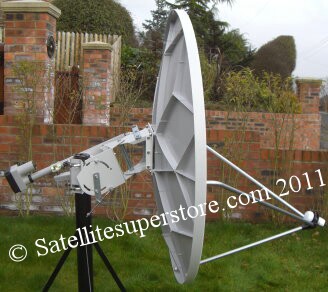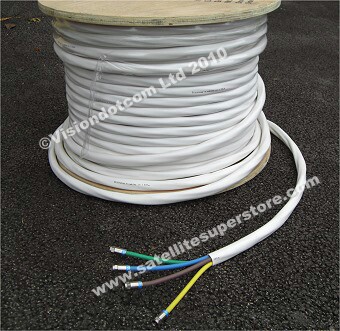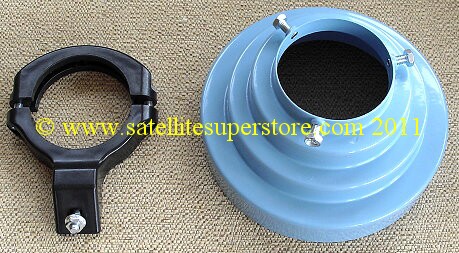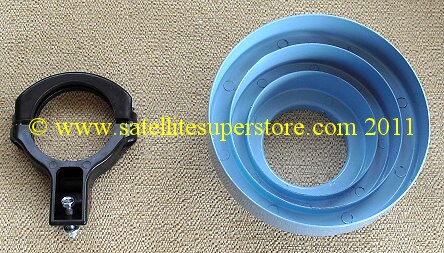Questions -
How much difference do low noise LNBs make and why do
some LNBs have a C120 flange and a feedhorn? Is there much difference
between the efficiency of different makes and types of dish?
AND,
How can I get more signal from my dish? Would a better LNB
help or a more sensitive receiver?
AND,
Problems with signal through trees.
AND,
Why does my lower noise LNB produce less signal?
Answers -
Dish size is everything.
Dish size is everything. LNBs only have a very very very very .... small effect as does receiver
sensitivity. Dish size is everything! Going from a 0.9dB to a 0.1dB does not have the effect of
5mm of dish diameter! and then the lower noise LNB will only help in good weather, virtually no
effect in bad weather. Bigger dishes provide more signal in all weathers. BUT .. if the dish size
cannot be increased for any reason, the lower noise LNB can help a small amount and it MIGHT be
just enough to pull in a difficult to receive channel that was just coming in but maybe pixilation or
freezing (a common fault caused usually by lack of signal) was a problem and may be stopped.
0.1dB LNBs! To achieve 0.1dBs over a significant frequency range, manufacturers would need super
cooling to slow the electrons down! Simply not possible at normal temperatures in the UK. It may
well be the case that the new 0.1dB LNBs have the lowest noise figures. They are very good LNBs.
Possibly even be the best, but they really can't be as low as 0.1dB or 0.2dB over any kind of
useful frequency range if at all. Some of us are getting old! I can still remember - when I was a
kid - back in the late 1950s early 1960s - not sure when - being told you could get a great picture
on the TV with an aerial shaped like a PLANT POT that could be stood on top of the TV.
(even with a plastic plant inside it!) We all now know that what was really needed was a decent
sized aerial on the roof (and preferably not in the loft - which can produce reflections!
Many people would like technology without wires in sealed boxes (like my wife, she will insist
on having the stuff in cabinets with doors on. This is better known as an cooking the technology
in an oven as it stops ventilation and creates a fire risks).
Many also want the smallest possible dish so the question is - "find an alternative solution to
getting more signal" BUT ... no matter how much people might want to .....
YOU CAN'T CHANGE THE LAWS OF PHYSICS! "Dish size is everything." It is a question that we hear
every day and sometimes customer think that if they ask the question in 4 or 5 different ways, they
will eventually hear a different answer. To repeat - Dish size is everything! Dish size is everything!
Dish efficiency.
This can be important. Especially among large dishes. The Andrews (Channel Master) 1.8m and 2.4m have a
very high gain due to very good design. Offset should be more efficient than prime focus if it is a
specialist well designed dish (not always true with smaller mass produced dishes). Webbed resin type plastic
is a perfect shape from leaving the factory to arriving at the customer. Metal petalised prime focus dishes
can be warped when they are new due to bad assembly or damage and tend to be very in-efficient.
See the Andrews (Channel Master) dishes on the
fixed dishes page and
motorised dishes page
for very high quality resin type perfect shaped dish products.
Matched feedhorns can pull in more signal than better LNBs. See below.
Feedhorns.
A normal 40 mm clamp LNB has an integral offset feedhorn for offset dishes like the
Triax dishes (see offset dishes on the
dishes page )
A Prime focus dish like the Unicorn (see an example of focus dishes on the
C Band LNBs page
A Prime focus dish should have its own feedhorn with "scalar rings" on one side and a
C120 flange on the other. See the prime focus feedhorns shown on the
Feedhorns
page
i.e. the Universal Feed and the Invacom feed, here you should use the C120 flange LNB which fits the Prime
Focus feed. If a prime focus dish does not have a proper feedhorn then it should have one.
The scalar rings on a prime focus feedhorn are a very important part of the design.
The feedhorn should really be designed and made by the dish manufacturer for a perfect match
but if this is not known or possible, fit a the
"universal feedhorn" on the feedhorns
page This will be the
best match possible. This kit only requires you to have the 3 feed support arms. The boss etc
is all in the kit.
The Andrews (Channel Master) offset feedhorn.
We have supplied this feed to customers who have found it made a worthwhile improvement.
If an LNB feed is not a perfect match, like a standard 40mm clamp LNB, it may illuminate (say) 1.1m
of a 1.2m dish. (less signal) OR, It may (try to) illuminate 1.3m of dish. This will cause infrared
(noise) to be picked up round the edges. The result is a poor signal to noise ratio. (poor picture)
Feedback from customers suggest that the matched feed on a Channel Master 1.2 as far west as Belfast
brought in all of Sirius. Before it was fitted this was not possible. More feedback suggested it can
make a difference in southern Spain For Sky TV and the BBC on an Andrews 1.8m dish and on the 2.4m Andrews
(Channel Master) dish from the Spanish offshore islands.
Receiver sensitivity.
This has only a very small effect on the signal. Most CI and free to air receivers are sensitive anyway.
Some Sky digiboxes, however, do not have particularly sensitive tuners. Not a problem in the UK but
in Spain a sensitive satellite receiver can help a little.
More information about LNBs.
An LNB is the box of electronics on the end of the dish boom arm. It acts like a aerial masthead
amplifier. The signal (microwaves) reflect off the dish and into the feedhorn to the LNB.
Here it is amplified and the frequency is lowered. The lower the noise figure the better.
i.e. in simple terms, it pulls in the signal better. The signal is then sent down the coaxial cable to the
satellite receiver. Quality digital cable should be used. (not CT100 or RG6)
See our
Satellite Cable for good digital cable. Also see
Twin satellite Cable See 4 LNB cable below.
A universal LNB covers the KU band from 10700 to 12750Ghz with LO frequencies of 9750 and 10600.
There are
Single LNBs, Twin
LNBs, Quad LNBs, Octo
LNBs and
Quatro LNBs. Single have one output,
twin - two outputs, quad - 4 outputs and Octo - 8 outputs. All outputs are the same and are equivalent to
a single LNB. A twin LNB could be used for two single tuner satellite receivers or a twin tuner satellite receiver
Quatro LNBs have 4 outputs and they are all different. Quatro LNBs can only be used with
multiswitches.
There are also 40mm clamp LNBs and C120 LNBs. This refers to the way they fit on a dish. A 40mm LNB has an
integral offset feedhorn and fits to the most common types of offset dishes.
C120 flange LNBs fit on a separate feedhorn and could be used on either offset or prime focus dishes.
They are usually used on specialist high quality dishes.
Both 40mm and C120 LNBs could have single, twin, quad or quatro outputs.
At the moment only 40mm LNBs have octo outputs.
Using a quatro LNB and a multiswitch it is possible to have many more outputs. Even 32 outputs or larger.
A
Sky mini dish LNB uses a fixing that is none standard and a tongue fits into the end of the boom
arm
To conclude,
"Dish area is everything". Other small gains are possible but they are small.
Large increases in signal are possible in all weathers with bigger dishes.
A large gain can be made if a dish is found to be warped and then corrected.
More efficient dishes provide gains but not as much as manufacturers claim they do.
When a manufacturer says their 50cm dish is equivalent to other 60 or 80cm dishes,
This is marketing not science! (Putting it another way this is sales jargon for lying!)
A more efficient dish might have the effect of being as good as a dish 1.0cm diameter bigger
but not the sort of silly claims some manufacturers (or dealers) make.
Small gains are possible with matched feedhorns
Very small gains might be possible with better LNBs or more sensitive tuners but they may be
too small to be significant
If trees are in the way, the signal will not get through them, however, if they are on the fringe
of being in the way - maybe only a thin band of branches and leaves with a good proportion of the
signal actually getting through, a bigger dish will collect more signal and compensate for the problem.
Better LNBs can producing less signal.
This is a very common question.
The important point here is that only a higher signal to noise ratio matters not the total signal level.
The total signal level is shown on a satellite meter and is NOT relevant. Meters do NOT measure the
quality of an LNB as meters are NOT measuring signal to noise ratio (over a frequency band.)
A high (signal) output LNB is good for driving a signal down a long cable (e.g. over 40m)
But a high signal to noise ratio pulls in weaker signals.
Remember - if you are looking at the meter reading in your receiver THAT TELLS YOU NOTHING AT ALL
as far as this particular question is concerned.
It only shows you the total signal and not the difference between the signal and the noise.
A poor 0.9dB (but high output) LNB on a short cable (not much attenuation) can produce
a large reading on a signal strength meter than a low output 0.1dB LNB.
A low output LNB (like an excellent 0.3dB Invacom) on a longer cable can show a low
signal on a signal strength meter.
So what?!! it has nothing at all to do with the ability to pull in a weak channel - nothing at all.
At a technical level, if you draw a graph with a horizontal line representing the signal
and a lower horizontal line representing the noise, the meter is simply showing the level of the
top line. With a high output LNB on a short cable the two lines move up equally BUT the height
difference between the two lines does not alter. With a low output LNB on a longer cable the two lines
move down equally BUT the height difference between them again does not alter. With a lower noise
LNB or bigger dish the height difference between the two lines INCREASES - we say there
is a better SIGNAL TO NOISE RATIO. A signal strength meter does not measure this parameter.
Anyone who says it does, probably has a no technical background in electronics. It is like
saying that the signal to noise ratio of a Hi Fi system is better if you turn up the volume.
Your ears would be equivalent to the signal strength meter and this statement would be
total rubbish as well - but it is an interesting, accurate analogy.
The only test is to check out the capability of pulling in weak channels - do not use the meter
for comparing LNBs. The meter is designed to help to locate the satellite accurately and
not to test the LNB.





